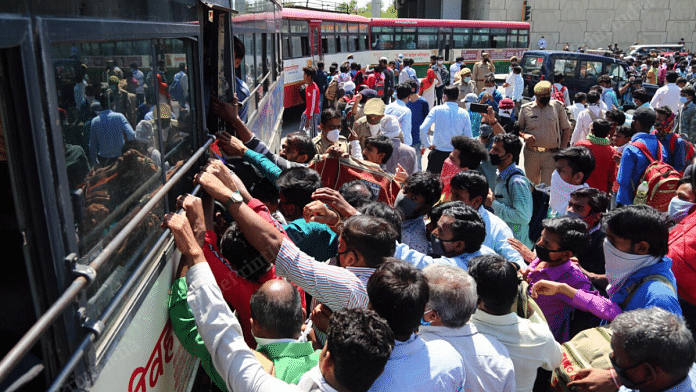New Delhi: The much-touted national database for unorganised workers, which the Narendra Modi government had announced to set up following last year’s migrant crisis during the lockdown, is expected to become operational this month, the Union Ministry of Labour and Employment informed Parliament Wednesday.
The government had faced criticism from the Supreme Court in June for delay in making the portal operational. On 29 June, the court had fixed 31 July as the deadline for the Centre to make the portal operational.
In a written reply in Rajya Sabha Wednesday, Rameshwar Teli, Minister of State, Labour and Employment said the process for dry run and security audit of the database is underway.
“The project is expected to commence the registration work within August, 2021,” Teli said in his reply.
Also read: Labour codes will miss July date as states aren’t ready, govt target now 1 Oct: Gangwar
What the portal will carry
The database will have details of all unorganised workers in the country, including construction workers, migrant workers, gig and platform workers, street vendors, and domestic, agriculture and migrant workers, and similar other sub-groups of unorganised workers.
It will also have details of the different social sector and welfare schemes run by the Centre and states targeting those in the unorganised sector. The workers will be able to avail of benefits of the schemes by registering and applying online, once the portal becomes functional.
There are approximately 40 crore workers in the informal sector, including 2-3 crore migrant workers.
The portal is being set up by the labour ministry at a cost of Rs 704 crore. The Ministry of Finance had approved the project in October 2020.
Hundreds of thousands of migrant workers lost their livelihoods and were left without shelter or food during the first lockdown. The Centre announced a slew of welfare schemes, including free ration and transfer of cash, for those workers who were hit the hardest. Despite the Centre’s initiative, many migrant workers were deprived of the benefits.
One of the major roadblocks faced by governments in making sure their schemes reach the beneficiaries was absence of a database. There is no consolidated data to identify the workers, the actual number of unorganised migrants and their whereabouts.
The labour ministry is collaborating with the National Informatics Centre under the Ministry of Electronics and Information Technology to develop the portal.
Govt has missed deadline many times
This was not the first time the Supreme Court directed the government to have a national database of migrant workers to ensure subsidies under various social welfare schemes are transferred to the actual beneficiaries.
In its 29 June order, the court referred to an August 2018 direction in which the Union labour ministry was asked to operationalise a portal by January 2019 and begin registration of 10 per cent migrant workers every month in each state.
The 2018 order was issued only after the labour ministry officials undertook to finalise a registration module for unorganised workers by end of December 2018 once the security audit was completed.
Despite an undertaking, the Centre failed to comply with the judicial directions and sought an extension of the deadline twice — February 2019 and January 2020. On both the occasions, the government had asked for six more months to complete the task of preparing a registration portal.
The order was given in a petition filed in 2012 to register domestic workers, part of India’s unorganised workforce, under the Unorganised Workers Social Security Act, 2008. Filed by the NGO, Shramjeevi Mahila Samiti, the petition had limited its prayer to registration of house helps working in Delhi.
Advocate Gunjan Singh, who represented the NGO, told ThePrint the purpose for filing the petition was to make sure the law gets implemented.
“The law requires registration of those working in the unorganised sector. How it should be done was not discussed during the early hearings of the petition. It was only later, when the court expanded the scope of the petition, that deliberations started to have an online portal,” he said.
(Edited by Amit Upadhyaya)
Also read: 2020 lockdown shut 11% women MSMEs, only 1% got back on feet with govt help, finds study



